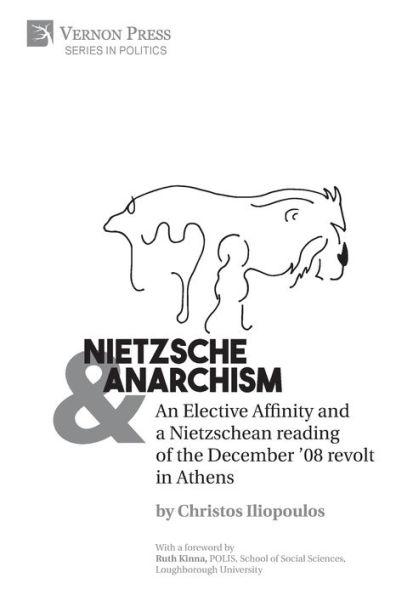Nietzsche & Anarchism: An Elective Affinity and a Nietzschean reading of the December '08 revolt in Athens

Nietzsche & Anarchism: An Elective Affinity and a Nietzschean reading of the December '08 revolt in Athens
This book aims to establish the bond between Friedrich Nietzsche and the anarchists, through the apparatus of "elective affinity", and to challenge the boundaries of several anarchist trends - especially "classical" and "post" anarchism - and "ideologies" like anarchism and libertarian Marxism. Moreover, it highlights the importance of reading Nietzsche politically, in a radical way, to understand his utility for the contemporary anarchist movement.
The review of the literature concerning the Nietzsche-anarchy relationship shows the previously limited bibliography and stresses the possibility of exploring this connection, with the methodological help of Michael Löwy's concept of "elective affinity". The significance of this finding is that the relevant affinity may contribute to an alternative, to the dominant, perception of anarchism as an ideology. It may also designate its special features together with its weaknesses, meaning the objections of Nietzsche to certain aspects of the anarchist practices and worldview (violence, resentment, bad conscience), thus opening a whole new road of self-criticism for the anarchists of the twenty first century. In addition, the location and analysis of the elective affinity serves the debunking of the Nietzschean concepts used by conservative and right-wing readings in order to appropriate Nietzsche, and of the accusations that the German philosopher had unleashed against anarchists, which reveals his misunderstanding of anarchist politics.
The final part of this book applies the whole analysis above on a Nietzschean reading of the December '08 revolt in Athens based on the "Of the Three Metamorphoses" discourse from Thus Spoke Zarathustra, offering an alternative view of the events that shook Greece and also had an important global impact.
PRP: 520.80 Lei
Acesta este Pretul Recomandat de Producator. Pretul de vanzare al produsului este afisat mai jos.
442.68Lei
442.68Lei
520.80 LeiLivrare in 2-4 saptamani
Descrierea produsului
This book aims to establish the bond between Friedrich Nietzsche and the anarchists, through the apparatus of "elective affinity", and to challenge the boundaries of several anarchist trends - especially "classical" and "post" anarchism - and "ideologies" like anarchism and libertarian Marxism. Moreover, it highlights the importance of reading Nietzsche politically, in a radical way, to understand his utility for the contemporary anarchist movement.
The review of the literature concerning the Nietzsche-anarchy relationship shows the previously limited bibliography and stresses the possibility of exploring this connection, with the methodological help of Michael Löwy's concept of "elective affinity". The significance of this finding is that the relevant affinity may contribute to an alternative, to the dominant, perception of anarchism as an ideology. It may also designate its special features together with its weaknesses, meaning the objections of Nietzsche to certain aspects of the anarchist practices and worldview (violence, resentment, bad conscience), thus opening a whole new road of self-criticism for the anarchists of the twenty first century. In addition, the location and analysis of the elective affinity serves the debunking of the Nietzschean concepts used by conservative and right-wing readings in order to appropriate Nietzsche, and of the accusations that the German philosopher had unleashed against anarchists, which reveals his misunderstanding of anarchist politics.
The final part of this book applies the whole analysis above on a Nietzschean reading of the December '08 revolt in Athens based on the "Of the Three Metamorphoses" discourse from Thus Spoke Zarathustra, offering an alternative view of the events that shook Greece and also had an important global impact.
Detaliile produsului









